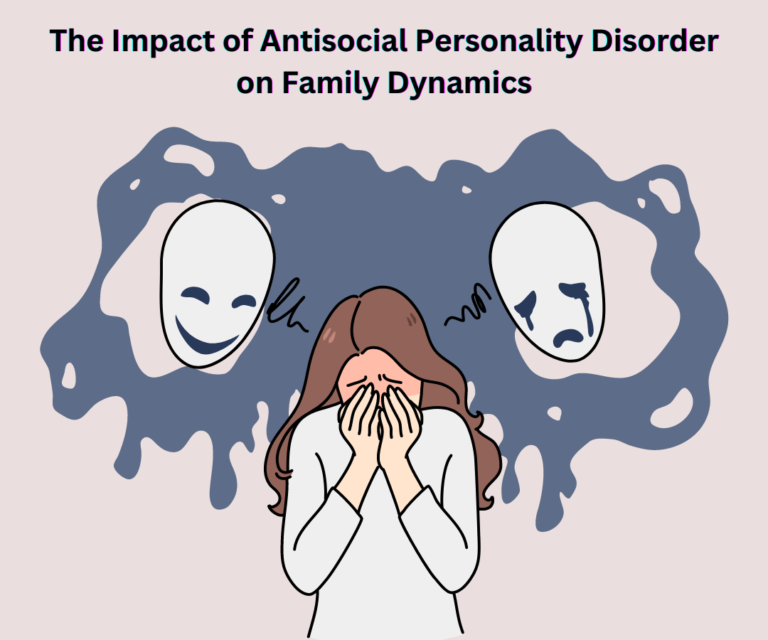With the nature of ASPD, family therapy might be crucial to the treatment of this illness. A family therapist can assist individuals in acquiring vital communication skills necessary to manage the intricate family dynamics linked to Autism Spectrum Disorder. Individual therapy sessions may prove advantageous for family members of individuals with ASPD in order to address and overcome any issues pertaining to their loved one’s personality disorder.
Individuals who suffer from antisocial personality disorder frequently manipulate, inflict cruel indifference, or intentionally provoke the anger or upset of others. They don’t feel guilty or regret what they did. This blog examines the several ways that ASPD can affect family life, the difficulties that families encounter, and coping mechanisms and support systems for both the loved one with ASPD and the individual with ASPD.
What is Antisocial Personality Disorder?
Antisocial Personality Disorder is a mental health illness defined by a continuous pattern of disdain for the rights of others, which frequently manifests as deceptive, manipulative, and lacking in remorse. Antisocial personality disorder has a far-reaching impact on family dynamics and relationships, in addition to the individual suffering from the illness.
Emotional Impact on Family Members
The emotional toll that ASPD has on families is one of its most important effects. Family members could feel a variety of things, such as:
- Stress and Anxiety: Chronic tension and worry can result from living with someone who engages in unpredictable and frequently harmful actions. It can be very overwhelming to live in continual anxiety of what might happen next.
- Shame and Guilt: Family members may experience shame for the person’s conduct or guilt for being unable to assist their loved one. This is especially true if the actions cause humiliation to the public or legal problems.
- Anger and Resentment: Anger and resentment can be triggered by the dishonest and manipulative behaviours linked to Asperger’s syndrome. Family members of the individual with ASPD may feel deceived or exploited.
- Sadness and Despair: It can be devastating to witness a loved one participate in self-destructive conduct. Family members could experience extreme melancholy and powerlessness.
Family Dynamics in ASPD
Developing compassion and comprehension
Fostering empathy and understanding among family members can be facilitated by family therapy. People with ASPD might become more conscious of how their antisocial actions affect other people, which could motivate them to acknowledge and take into account the needs and feelings of their family members. In a similar vein, family members may develop understanding of the underlying causes of ASPD and learn to distinguish the individual from the illness, which may promote compassion and empathy.
Establishing sound limits and trust
A common focus of family therapy is setting and upholding sound boundaries within the family unit. Therapy can assist family members in establishing boundaries, setting expectations, and enforcing penalties for misbehavior in order to establish a controlled atmosphere that fosters safety, respect, and accountability. Furthermore, family therapy usually succeeds.
Engaging up communication and conflict resolution
This treatment can offer a disciplined setting for enhancing communication and settling disputes within the family. It can impart vital communication skills, such as active listening, which can support family members in effectively expressing their wants, feelings, and worries. It might lessen the likelihood of miscommunications or power struggles.
Therapies for Antisocial Personality Disorder
Aspects of anger management, drug addiction treatment, and other therapies that focus on certain symptoms, behaviors, or coexisting disorders may also be included in therapy.
- Democratic Rehabilitative Community
- Cognitive Behavioral Therapy
- Medication
- Talk Therapy
- Psychotherapy
- Counseling for Impulsive Lifestyles
Disruption of Duties and Roles in the Family
A chaotic and unbalanced family dynamic might result from the disruption of typical family roles and responsibilities of ASPD. This interference may show up in some ways:
Relationships between parents and children: When a parent with ASPD cannot give regular care and assistance, it might cause role reversals in which the child takes on caring duties. On the other hand, parents who have an ASPD child may find it difficult to control their conduct and uphold their authority.
Relationships Between Siblings: Parents who devote their time and energy to treating their autistic child may leave their siblings feeling abandoned. This may give rise to jealousy and anger.
Stress in the Marriage: Living with an individual with Autism spectrum disorder can significantly strain a couple’s marriage. Differing opinions amongst partners about managing the circumstance may cause friction and, in certain situations, separation or divorce.
Medical, mental health, and counseling services are available if you or someone you love is experiencing antisocial behaviors and perhaps ASPD. Insurance usually covers treatment for ASPD. It could be challenging to locate a specialist for ASPD, but using the insurance companies‘ directories could be a helpful place to start.
It is almost impossible to receive therapy for a problem that a person is unaware they have or refuses to acknowledge. For this reason, a large number of those seeking treatment for ASPD are required to do so by law or at their friends’ and family’s request.
Families with members with antisocial personality disorder have many obstacles because it interferes with emotional health, modifies family dynamics, and can lead to financial and legal issues. Families may overcome these obstacles and help their loved one with ASPD, though, if they have access to information, resources, and practical coping mechanisms. Family members must put their own health first, get professional assistance, and make connections with people who can relate to their experiences. In spite of the difficulties presented by ASPD, they can do this in order to promote a more stable and healthy family atmosphere.





